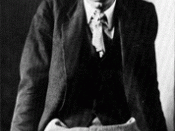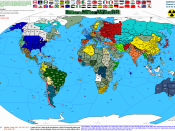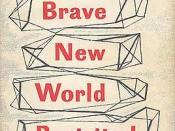Aldous Huxley saw problems with the world, and he wrote a novel about a fictional solution. In his novel, Brave New World, people of the distant future are part of a radical new society. the planners of this utopic system of social organization seek to abolish inequalities among humans, social unrest, war, unhappiness, and the miserable human condition. Although this utopia is set hundreds of years into the future, it contains elements of our contemporary culture that Huxley points to as a warning of things to come.
The theme of Brave New World is not the advancement of science as such; it is the advancement of science as it affects human individuals. In Brave New World, it is scientific development that makes the genetic engineering and conditioning possible. Humans are mass produced using the Bokanovsky process, in which embryos are formed in test tubes on reservations. One of the threats of this genetic breeding is that no family structures exist on the reservation.
Instead, humans are raised in conditioning centers. Human life holds no value because it can be easily replaced. Furthermore, this method of mass production prevents individuality. Genetically shaping the minds of society into classifications of varying intelligence means stopping the process of random mutation, natural selection, and ultimately, the process of evolution. Everything is completely mechanized, eliminating the need for creativity and imagination. A world of this type goes nowhere, and it's habitants have no aspirations.
A standardized means of happiness is brainwashed into people's minds as the only means of happiness. The primary source of entertainment is the "feelies," a type of movie theatre in which all the senses are artificially created. Stimulation from the feelies prevent people from free thought, which threatens society by denying people from experiencing their own creativity and...



I agree
This essay would make alot more sense if you did the things you suggested in the note at the bottom.
It seems like you really only touched on some of the issues raised in Brave New World - each of the issues really needs its own paragraph or two so you can felsh out + explore it a bit more.
1 out of 1 people found this comment useful.